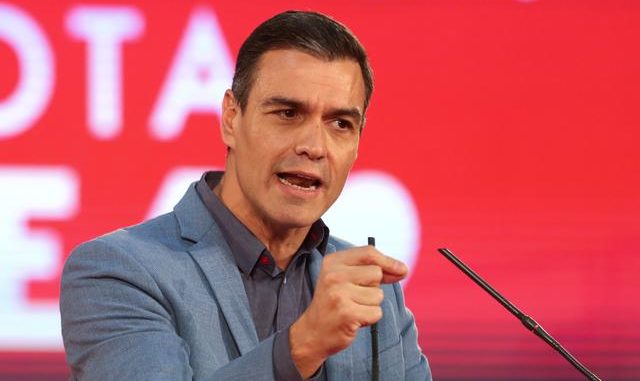
Spain held a parliamentary election on Sunday, its second this year, in a vote that could still fail to break a protracted stalemate in a fragmented political environment. Following are snapshots of the main parties and leaders:FILE PHOTO: Spanish acting Prime Minister and Socialist Workers’ Party (PSOE) leader Pedro Sanchez gestures as he speaks during a campaign closing rally ahead of general election, in Alcala de Henares, near Madrid, Spain November 8, 2019. REUTERS/Sergio Perez/File Photo
PEDRO SANCHEZ’S SOCIALIST WORKERS’ PARTY (PSOE)
Socialist party leader Pedro Sanchez, 47, a trained economist, called the snap election after failing to secure support from other parties after winning the most votes, but no working majority, in an election in April.
Most opinion polls point to the PSOE re-emerging as the largest party but again landing far short of a majority, and probably with fewer seats than in the previous ballot, requiring the support of other parties to form a government.
Recent events, particularly tensions over separatism in Catalonia, have boosted right-wing parties and could reshape the distribution of seats.
On Oct. 24, Sanchez’s caretaker government removed the remains of late dictator General Francisco Franco from a state mausoleum in a historic, symbolically powerful step that could help him mobilize left-wing voters.
PSOE is Spain’s oldest active party and one of two that have dominated the political landscape since Franco’s rule ended with his death in 1975. It has been in government longest since then.
PABLO CASADO’S PEOPLE’S PARTY (PP)
A conservative, Christian democratic party, and the Socialists’ main rival for decades.
Pablo Casado, a 38-year-old lawyer and economist, became party leader a month after the government of Sanchez’s predecessor Mariano Rajoy was ousted by Sanchez last year.
He obtained PP’s worst ever election result in April with just 66 seats in the 350-seat house, but polls see PP faring much better next week, possibly putting Casado in the position of kingmaker.
Casado has promised to cut taxes and has called for Catalonia to be “reconquered” following the northeastern region’s failed independence bid in 2017.
A critic of Sanchez’s handling of the Catalan issue, Casado is known as a defender of family values, the monarchy and the Catholic Church, and an opponent of abortion and euthanasia.
SANTIAGO ABASCAL’S VOX
An anti-immigration, nationalist party founded in 2013 by former PP members.
In April, Vox became the first far-right party to enter Spain’s parliament since the 1980s, with 24 seats, and polls show it could now become the third-biggest force there, with possibly as many as 44 seats.
Vox opposes gender equality laws and is strongly against autonomy for Spain’s regions.
Its leader Santiago Abascal, 43, is a tough-talking career politician from the Basque country, who harshly criticized the exhumation of Franco and who wants Catalan separatism quashed.
Echoing U.S. President Donald Trump’s anti-immigration rhetoric, he has called for a secure wall to be built around the Spanish enclaves of Ceuta and Melilla and for neighboring Morocco to pay for it.
“I am a supporter of discrimination,” he told 7TV Andalucia in 2017.
ALBERT RIVERA’S CIUDADANOS (CITIZENS)
A center-right, pro-European party originally from Catalonia and part of the Alliance of Liberals and Democrats for Europe that first won Spanish parliament seats in 2015.Slideshow (5 Images)
Its leader, Albert Rivera, 39, worked in a bank before founding Ciudadanos in 2006.
Rivera, who backed Sanchez in his failed 2016 bid for premiership, refused him support after April election, leaving him no option but to seek support from left-wing Unidas Podemos.
Polls show Ciudadanos would lose seats after several senior figures quit over regional deals it has struck with the far-right. Ciudadanos is a stalwart defender of Spain’s unity and strongly opposes any concessions to separatists.
PABLO IGLESIAS’ UNIDAS PODEMOS (TOGETHER WE CAN)
An alliance of left-wing Podemos, United Left, and other parties, created in the run-up to the 2016 election and rooted in the anti-austerity protest movement. The name was tweaked in 2019 to make it female to reflect its pro-feminism stance.
Its leader, political scientist and lecturer Pablo Iglesias, 41, founded Podemos in 2014.
Podemos had tried in vain to negotiate a governing coalition deal with PSOE up to the very last minute in September, but Sanchez ultimately refused to give them cabinet posts, saying that Iglesias’ excessive demands had torpedoed such a solution.
MAS PAIS (MORE COUNTRY)
Its leader, Iñigo Errejon, 35, is a former Podemos lawmaker who left the party after disagreements with Iglesias. Errejon says Mas Pais was created to help Spain break the current political deadlock. It defines itself as a modern, feminist, green political movement.
Mas Pais seeks seats only in those districts where it has real chances to win, so as not to split the left-wing vote.
CUP (POPULAR UNITY CANDIDACY)
A pro-independence and anti-capitalist party from Catalonia. Polls show it could win four seats in its national election debut, boosted by recent street protests.
Reporting by Elena Rodriguez and Andrei Khalip; Editing by Belen Carreno, Mark Heinrich and Frances Kerry
MADRID (Reuters) –
